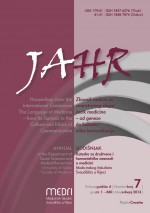Doblespeak: Using language to conceal the message in a political, military and medical context
Keywords:
doublespeak, deceptive language, spin, conceal message, global village, ectification of names, medical insuranceAbstract
Half a century has passed since Marshall McLuhan's 'The Gutenberg Galaxy: The Making of Typographic Man' came into being, introducing the now famous term 'global village', but the passing years have only added to the actuality of the phrase. In 2012 the world seems to have shrunk to the dimensions of one's own living room, where one can witness Alexander the Great's army defeating the Persians in the Battle of Issus in 333 BC, and contemporary Baghdad being bombed at night, all while having dinner.In a world, where economic interests dictate the unleashing of global wars, controlling the proliferation of message content in the global village has become exponentially important. Confucius' rectification of names seems to have fallen from grace with the rulers of today: those in power have found a way to use language as a smoke screen – or a concave mirror – and words have been utilized to conceal meaning rather than convey it.Doublespeak has become the norm of political and military language, as well as certain as-pects of communication within a medical context: the general public has been willfully de-ceived into misinterpreting the message.
Downloads
Published
Issue
Section
License
Authors who publish with this journal agree to the following terms:
- Authors retain copyright and grant the journal right of first publication with the work simultaneously licensed under a Creative Commons Attribution License that allows others to share the work with an acknowledgement of the work's authorship and initial publication in this journal.
- Authors are able to enter into separate, additional contractual arrangements for the non-exclusive distribution of the journal's published version of the work (e.g., post it to an institutional repository or publish it in a book), with an acknowledgement of its initial publication in this journal.
- Authors are permitted and encouraged to post their work online (e.g., in institutional repositories or on their website) prior to and during the submission process, as it can lead to productive exchanges, as well as earlier and greater citation of published work (See The Effect of Open Access).



